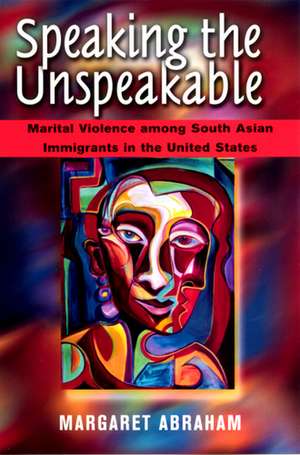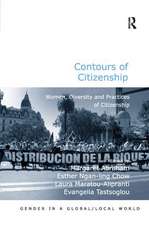Speaking the Unspeakable: Marital Violence among South Asian Immigrants in the United States
Autor Margaret Abrahamen Limba Engleză Paperback – apr 2000
Over the past 20 years, much work has focused on domestic violence, yet little attention has been paid to the causes, manifestations, and resolutions to marital violence among ethnic minorities, especially recent immigrants. Margaret Abraham’s Speaking the Unspeakable is the first book to focus on South Asian women’s experiences of domestic violence, defined by the author as physical, sexual, verbal, mental, or economic coercion, power, or control perpetrated on a woman by her spouse or extended kin. Abraham explains how immigration issues, cultural assumptions, and unfamiliarity with American social, legal, economic, and other institutional systems, coupled with stereotyping, make these women especially vulnerable to domestic violence.
Abraham lets readers hear the voices of abused South Asian women. Through their stories, we learn of their weaknesses and strengths, and of their experiences of domestic violence within the larger cultural, social, economic, and political context. We see both the individual strategies of resistance against their abusers as well as the pivotal role South Asian organizations play in helping these women escape abusive relationships.
Abraham also describes the central role played by South Asian activism as it emerged in the 1980s in the United States, and addresses the ideas and practices both within and outside of the South Asian community that stereotype, discriminate, and oppress South Asians in their everyday lives.
Abraham lets readers hear the voices of abused South Asian women. Through their stories, we learn of their weaknesses and strengths, and of their experiences of domestic violence within the larger cultural, social, economic, and political context. We see both the individual strategies of resistance against their abusers as well as the pivotal role South Asian organizations play in helping these women escape abusive relationships.
Abraham also describes the central role played by South Asian activism as it emerged in the 1980s in the United States, and addresses the ideas and practices both within and outside of the South Asian community that stereotype, discriminate, and oppress South Asians in their everyday lives.
Preț: 292.29 lei
Nou
Puncte Express: 438
Preț estimativ în valută:
55.93€ • 58.54$ • 46.55£
55.93€ • 58.54$ • 46.55£
Carte tipărită la comandă
Livrare economică 31 martie-14 aprilie
Preluare comenzi: 021 569.72.76
Specificații
ISBN-13: 9780813527932
ISBN-10: 0813527937
Pagini: 264
Ilustrații: 1
Dimensiuni: 156 x 235 x 18 mm
Greutate: 0.45 kg
Ediția:None
Editura: Rutgers University Press
Colecția Rutgers University Press
ISBN-10: 0813527937
Pagini: 264
Ilustrații: 1
Dimensiuni: 156 x 235 x 18 mm
Greutate: 0.45 kg
Ediția:None
Editura: Rutgers University Press
Colecția Rutgers University Press
Notă biografică
Margaret Abraham is an associate professor of sociology at Hofstra University.
Cuprins
Preface
Acknowledgments
Introduction: Framing the Issues
Marriage and Family
Immigrant Status and Marital Violence
Isolation: Alone in a Foreign Country
Sexual Abuse
Internal and External Barriers: It's Not Only the Abuser
Fighting Back: Abused Women's Strategies of Resistance
Making a Difference: South Asian Women's Organizations in the United States
Looking Back, Looking Ahead: Reflections on Our Transformational Politic
Appendix A. Profile of Respondents at Time of Interview
Appendix B. Notes on the Research Process
Notes
References
Index
Acknowledgments
Introduction: Framing the Issues
Marriage and Family
Immigrant Status and Marital Violence
Isolation: Alone in a Foreign Country
Sexual Abuse
Internal and External Barriers: It's Not Only the Abuser
Fighting Back: Abused Women's Strategies of Resistance
Making a Difference: South Asian Women's Organizations in the United States
Looking Back, Looking Ahead: Reflections on Our Transformational Politic
Appendix A. Profile of Respondents at Time of Interview
Appendix B. Notes on the Research Process
Notes
References
Index
Recenzii
Margaret Abraham breaks through the myth of the 'model minority' and speaks the unspeakable: violence against women in our families. She articulates the complexities of domestic violence in South Asian women's lives circumscribed by culture, tradition, law, and isolation in a new country. Through it all, we hear women's voices and experiences loud and clear.
This groundbreaking book combines an insightful scholarly analysis with the powerful voices of women. Also important are its presentation of sexual abuse and its emphasis on individual and community resistance and on cultural and legal oppression.
This groundbreaking book combines an insightful scholarly analysis with the powerful voices of women. Also important are its presentation of sexual abuse and its emphasis on individual and community resistance and on cultural and legal oppression.
Descriere
Over the past 20 years, much work has focused on domestic violence, yet little attention has been paid to the causes, manifestations, and resolutions to marital violence among ethnic minorities, especially recent immigrants. Margaret Abraham’s Speaking the Unspeakable is the first book to focus on South Asian women’s experiences of domestic violence, defined by the author as physical, sexual, verbal, mental, or economic coercion, power, or control perpetrated on a woman by her spouse or extended kin. Abraham explains how immigration issues, cultural assumptions, and unfamiliarity with American social, legal, economic, and other institutional systems, coupled with stereotyping, make these women especially vulnerable to domestic violence.

